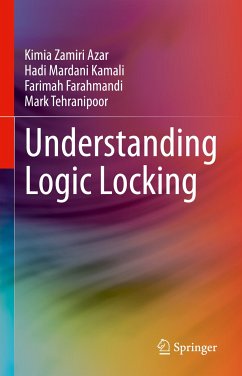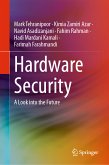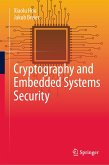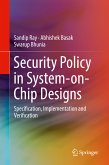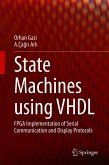Understanding Logic Locking (eBook, PDF)


Alle Infos zum eBook verschenken

Understanding Logic Locking (eBook, PDF)
- Format: PDF
- Merkliste
- Auf die Merkliste
- Bewerten Bewerten
- Teilen
- Produkt teilen
- Produkterinnerung
- Produkterinnerung

Hier können Sie sich einloggen

Bitte loggen Sie sich zunächst in Ihr Kundenkonto ein oder registrieren Sie sich bei bücher.de, um das eBook-Abo tolino select nutzen zu können.
This book demonstrates the breadth and depth of IP protection through logic locking, considering both attacker/adversary and defender/designer perspectives. The authors draw a semi-chronological picture of the evolution of logic locking during the last decade, gathering and describing all the DO's and DON'Ts in this approach. They describe simple-to-follow scenarios and guide readers to navigate/identify threat models and design/evaluation flow for further studies. Readers will gain a comprehensive understanding of all fundamentals of logic locking. Covers modern VLSI design, testability and…mehr
- Geräte: PC
- ohne Kopierschutz
- eBook Hilfe
- Größe: 18.42MB
![Hardware Security (eBook, PDF) Hardware Security (eBook, PDF)]() Mark TehranipoorHardware Security (eBook, PDF)97,95 €
Mark TehranipoorHardware Security (eBook, PDF)97,95 €![Split Manufacturing of Integrated Circuits for Hardware Security and Trust (eBook, PDF) Split Manufacturing of Integrated Circuits for Hardware Security and Trust (eBook, PDF)]() Ranga VemuriSplit Manufacturing of Integrated Circuits for Hardware Security and Trust (eBook, PDF)69,95 €
Ranga VemuriSplit Manufacturing of Integrated Circuits for Hardware Security and Trust (eBook, PDF)69,95 €![Trustworthy Hardware Design: Combinational Logic Locking Techniques (eBook, PDF) Trustworthy Hardware Design: Combinational Logic Locking Techniques (eBook, PDF)]() Muhammad YasinTrustworthy Hardware Design: Combinational Logic Locking Techniques (eBook, PDF)69,95 €
Muhammad YasinTrustworthy Hardware Design: Combinational Logic Locking Techniques (eBook, PDF)69,95 €![Cryptography and Embedded Systems Security (eBook, PDF) Cryptography and Embedded Systems Security (eBook, PDF)]() Xiaolu HouCryptography and Embedded Systems Security (eBook, PDF)81,95 €
Xiaolu HouCryptography and Embedded Systems Security (eBook, PDF)81,95 €![Security Policy in System-on-Chip Designs (eBook, PDF) Security Policy in System-on-Chip Designs (eBook, PDF)]() Sandip RaySecurity Policy in System-on-Chip Designs (eBook, PDF)40,95 €
Sandip RaySecurity Policy in System-on-Chip Designs (eBook, PDF)40,95 €![Hardware Security Training, Hands-on! (eBook, PDF) Hardware Security Training, Hands-on! (eBook, PDF)]() Mark TehranipoorHardware Security Training, Hands-on! (eBook, PDF)61,95 €
Mark TehranipoorHardware Security Training, Hands-on! (eBook, PDF)61,95 €![State Machines using VHDL (eBook, PDF) State Machines using VHDL (eBook, PDF)]() Orhan GaziState Machines using VHDL (eBook, PDF)48,95 €
Orhan GaziState Machines using VHDL (eBook, PDF)48,95 €-
-
- -46%11
- Covers modern VLSI design, testability and debug, and hardware security threats at different levels of abstraction;
- Provides a comprehensive overview of logic locking techniques and their applications to hardware security;
- Covers logic locking from implementation to evaluation, different assumptions, models and abstraction layers.
Dieser Download kann aus rechtlichen Gründen nur mit Rechnungsadresse in A, B, BG, CY, CZ, D, DK, EW, E, FIN, F, GR, HR, H, IRL, I, LT, L, LR, M, NL, PL, P, R, S, SLO, SK ausgeliefert werden.
- Produktdetails
- Verlag: Springer International Publishing
- Seitenzahl: 381
- Erscheinungstermin: 22. September 2023
- Englisch
- ISBN-13: 9783031379895
- Artikelnr.: 69028616
- Verlag: Springer International Publishing
- Seitenzahl: 381
- Erscheinungstermin: 22. September 2023
- Englisch
- ISBN-13: 9783031379895
- Artikelnr.: 69028616
- Herstellerkennzeichnung Die Herstellerinformationen sind derzeit nicht verfügbar.
Hadi Mardani Kamali is a postdoctoral research associate at Florida Institute for Cybersecurity Research (FICS), the Department of Electrical and Computer Engineering at the University of Florida. He received his Ph.D. degree from the Department of Electrical and Computer Engineering at George Mason University, 2021. He received his M.S. and B.S. from the Department of Electrical and Computer Engineering at Sharif University of Technology, 2013, and K. N. T. University, 2011, respectively. His research delves into hardware security with a particular focus on exploiting IP protection techniques, design-for-trust for VLSI circuits, and CAD frameworks for security (design-for-security), in which he has numerous publications in top journals and conferences including IEEE Transactions on Computers, IEEE Transactions on VLSI, IACR Transactions on Cryptographic Hardware and Embedded Systems (CHES), and Design Automation Conference (DAC),with awards including nominations for Best Paper Award in ISVLSI'20, ICCAD'20, ICCAD'21, and IEEE CAS 2020.
Farimah Farahmandi is an assistant professor in the Department of Electrical and Computer Engineering at the University of Florida. She received her Ph.D. from the Department of Computer and Information Science and Engineering at the University of Florida, 2018. She received her B.S. and M.S. from the Department of Electrical and Computer Engineering at the University of Tehran, Iran, in 2010 and 2013, respectively. Her research interests include design automation of System-on-Chips and energy-efficient systems, formal verification, hardware security validation, and post-silicon validation and debug. Her research has resulted in two books, seven book chapters, and several publications in premier ACM/IEEE journals and conferences, including IEEE Transactions on Computers, IEEE Transactions on CAD, Design Automation Conference (DAC), and Design Automation and Test inEurope (DATE). Her research has been recognized by several awards, including IEEE System Validation and Debug Technology Committee Student Research Award, Gartner Group Info-Tech Scholarship, a nomination for the Best Paper Award in ASPDAC 2017, and DAC Richard Newton Young Student Fellowship. She has actively collaborated with various research groups (IBM, Intel, and Cisco) that have led to several joint publications. She currently serves as an Associate Editor of IET Computers & Digital Techniques. She also has served on many technical program committees as well as organizing committees of premier ACM and IEEE conferences. Her research has been sponsored by SRC, AFRL, DARPA, and Cisco. She is a member of IEEE and ACM.
Mark Tehranipoor received his Ph.D. from the University of Texas at Dallas in 2004. He is currently the Intel Charles E. Young Preeminence Endowed Chair Professor in Cybersecurity at the University of Florida. His current research projects include: hardware security and trust, supply chain security, IoT Security, VLSI design, test and reliability. Dr. Tehranipoor has published over 400 journal articles and refereed conference papers and has given about 200 invited talks and keynote addresses. He has published 11 books and more than 20 book chapters. He is a recipient of a dozen best paper awards and nominations, as well as the 2008 IEEE Computer Society (CS) Meritorious Service Award, the 2012 IEEE CS Outstanding Contribution, the 2009 NSF CAREER Award, and the 2014 AFOSR MURI award. He serves on the program committee of more than a dozen leading conferences and workshops. He has also served as Program Chair of a number of IEEE and ACM sponsored conferences and workshops (HOST, ITC, DFT, D3T, DBT, NATW, and more). He co-founded the IEEE International Symposium on Hardware-Oriented Security and Trust (HOST) and served as HOST-2008 and HOST-2009 General Chair. He is currently serving as a founding EIC for Journal on Hardware and SystemsSecurity (HaSS) and Associate Editor for JETTA, JOLPE, IEEE TVLSI and ACM TODAES. Prior to joining UF, Dr. Tehranipoor served as the founding director for CHASE and CSI centers at the University of Connecticut. He is currently serving as a founding director for Florida Institute for Cybersecurity Research (FICS). Dr. Tehranipoor is a Fellow of the IEEE, a Golden Core Member of IEEE CS, and Member of ACM and ACM SIGDA.
